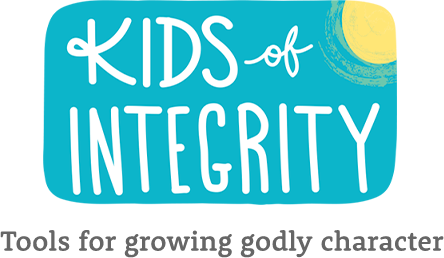Confidence

Creative discipline
Here are some ideas to help you impress on your kids the importance of having a right view of themselves: acknowledging their tendency to sin, recognizing their incredible value in God’s eyes, and being content with who they were created to be.
For problems with admitting sinfulness or admitting being in the wrong
The concept you’ll want to share with your children is that if we think too highly of ourselves, it’s easy to overlook our sins. If we claim to be perfect, or say that we don’t sin, it’s like telling God we think He is not telling the truth. But the Bible tells us that it is impossible for God to lie (Hebrews 6:18).
Biblical basis
Psalm 36:1-2 “An oracle is within my heart concerning the sinfulness of the wicked: There is no fear of God before his eyes. For in his own eyes he flatters himself too much to detect or hate his sin.”
1 John 1:8,10 “If we claim to be without sin, we deceive ourselves and the truth is not in us. . . . If we claim we have not sinned, we make Him out to be a liar and His word has no place in our lives.”
Proverbs 13:10 “Pride only breeds quarrels, but wisdom is found in those who take advice.”
Proverbs 16:5 “The Lord detests all the proud of heart. Be sure of this: They will not go unpunished.”
Suggested disciplinary action
The root issue in refusing to admit to being in the wrong is pride. A self-righteous person will not acknowledge their sinfulness. In order to be forgiven, we need to recognize and “own” our sin. As a parent, you cannot force your children to do this. It is a heart issue. You can make a child say they’re sorry, but you cannot change an unrepentant attitude; only God can do this.
Your choice of disciplinary action should involve setting time aside for your child to do a “heart check.” Be sure your child is in a place where they are away from any distractions and ask him / her to sit quietly and talk to God.
Gently, but firmly, tell your child that refusing to admit that they have done wrong is prideful, and that pride is not pleasing to God. Share Proverbs 16:5 and ask your child to have a talk with God about what an appropriate discipline would be for them. Tell your child that you are going to have the same visit with God.
After the time out, if your child is repentant, you can share with him / her the good news of forgiveness and let him / her know that you think the time out was enough discipline. If your child remains stubbornly unrepentant, you will need to select another form of removing privileges until you see that your child is ready to admit that his / her actions were wrong.
Affirmation
The most wonderful news is that as much as God hates pride, He loves a sorry heart. Share what God says in Isaiah 66:2b. Pray with your child and thank God for their humble heart. Remind your child of the truth found in 1 John 1:9.
Isaiah 66:2b “This is the one I esteem: he who is humble and contrite in spirit, and trembles at My word.”
1 John 1:9 “If we confess our sins, He is faithful and just and will forgive us our sins and purify us from all unrighteousness.”
For problems with self-acceptance, insecurity or viewing oneself negatively
It may seem harsh to discipline a child who already feels negatively about themself, but what children who are insecure really need is discipleship – guidance in learning “God-confidence.” The goal of discipleship discipline, in this case, is to help your child see himself or herself as loved and valuable, and as having potential to be used by God despite their perceived inadequacies.
Biblical basis
Your child needs to know that they are dearly loved by God and have been chosen by God to be His child! As God’s children, the Bible asks us to “clothe” ourselves with compassion, kindness, humility, gentleness and patience. Our focus, as children of God, should be to “dress” or live in a way that honours God so that we can do the “God jobs” He has selected for us to do. (The Bible refers to this as “bearing fruit.”)
Proverbs 29:25 “Fear of man will prove to be a snare, but whoever trusts in the Lord is kept safe.”
Colossians 3:12 “Therefore, as God’s chosen people, holy and dearly loved, clothe yourselves with compassion, kindness, humility, gentleness and patience.”
John 15:16 “You did not choose Me, but I chose you and appointed you to go and bear fruit – fruit that will last. Then the Father will give you whatever you ask in My name.”
Suggested disciplinary action
Take some time to read and review the Bible story “Moses feels mousey,” then memorize Psalm 118:7a with your child.
Psalm 188:7a “The Lord is with me; He is my helper.”
Affirmation
Share with your child the idea that “under-confidence” can be a great reminder that we need to trust God instead of ourselves. Explain that, if we were already perfect, or fully capable of living life without God, we wouldn’t need Him. For this reason, we should be happy about the things we see in ourselves as weakness because our insecurities can remind us that in Christ we can be strong!
Pray together, asking that your child will put their confidence in God and be willing to do the jobs God has planned for him or her to do.
Philippians 4:13 “I can do everything through Him who gives me strength.”
For problems with jealousy and constant comparison to others
Biblical basis
Kids can be very self-centered – some more than others. Your goal is to help your children understand that “pre-occupation with self” is wrong at any time, whether it’s thinking about oneself too highly, or constantly comparing our talents, resources or looks with other people’s. God doesn’t want us to be overly focused on “self” and personal attributes such as wisdom, money or strength. He wants us to concern ourselves with knowing and loving Him.
Jeremiah 9:23-24 “This is what the Lord says: ‘Let not the wise man boast of his wisdom or the strong man boast of his strength or the rich man boast of his riches, but let him who boasts boast about this: that he understands and knows me, that I am the Lord, who exercises kindness, justice and righteousness on earth, for in these I delight,’ declares the Lord.”
Suggested disciplinary action
When you see one of your children comparing themself to another person, pull them aside for a “heart check” or a “time out.” Introduce the idea that being overly focused on ourself is pride. During your child’s time out, have them reflect on the question, What am I most worried about: pleasing myself, or pleasing God?
Your goal in this process is to encourage your child to be grateful for his or her gifts, rather than covetous of what God has given others. You want him or her to understand that God gives each person different gifts, and that they need to be content with the ones God gave to them.
Read James 4:1-3 together and note that the Bible says the outcome of wanting what others have is fighting and quarrelling.
Ask your child to thank God for two gifts God has given the person your child is comparing themself with. Then have your child thank God for two things that are special about himself or herself.
James 4:1-3 “What causes fights and quarrels among you? Don’t they come from your desires that battle within you? You want something but don’t get it. You kill and covet, but you cannot have what you want. You quarrel and fight. You do not have, because you do not ask God. When you ask, you do not receive, because you ask with wrong motives, that you may spend what you get on your pleasures.”
Affirmation
Encourage your child to pray, admitting to God that they have been overly concerned about what they have or don’t have, and about what others think of them. Ask God to help your child be content with what they have and with whom God made him or her to be. Encourage them to ask God to help them desire to be righteous and godly more than they desire status and “stuff.”
In God’s Word, 1 Timothy 6 discusses seeking after money as a problem, but seeking anything more passionately than we seek after God is spiritually unhealthy.
1 Timothy 6:6-11 “But godliness with contentment is great gain. For we brought nothing into the world, and we can take nothing out of it. But if we have food and clothing, we will be content with that. People who want to get rich fall into temptation and a trap and into many foolish and harmful desires that plunge men into ruin and destruction. For the love of money is a root of all kinds of evil. Some people, eager for money, have wandered from the faith and pierced themselves with many griefs. But you, man of God, flee from all this, and pursue righteousness, godliness, faith, love, endurance and gentleness.”
For problems with overly assertive or controlling behavior (a.k.a. bossiness)
Sometimes poor self-image is manifested in overly controlling behavior, or in a critical attitude. On the outside it may seem as though the child is assertive and confident, but in reality, they are hiding their feelings of inadequacy by attempting to elevate themselves and put others down. In you suspect this is the case, you can also refer to “problems with self-acceptance” within this section.
Biblical basis
Ephesians 5:21 “Submit to one another out of reverence for Christ.”
Ephesians 5:1-2 “Be imitators of God, therefore, as dearly loved children and live a life of love, just as Christ loved us and gave Himself up for us as a fragrant offering and sacrifice to God.”
Suggested disciplinary action
Explain that God is pleased when we follow Jesus’ example of living to please Him and others, instead of ourselves. When we revere (deeply respect) Jesus and have His love in us, we let others have their own way instead of insisting on having things happen our way. This is called submission.
Have your child spend some quiet time away from the situation in which he or she was being overly demanding, selfish or bossy, and read to your child the last part the story of Jesus and the woman at the well found in John 4:27-34.
In this story, it sounds as though the disciples were pressuring Jesus to get on with His day and take care of His hunger (His own physical needs) instead of caring for the (spiritual) needs of the woman and others from her town. Jesus considered sharing God’s love and the message of salvation to be so important that He said, “My food is to do the will of Him who sent Me and to finish His work” (John 4:34).
We can fool ourselves into thinking that getting what we want is more important than serving others, but life is more enjoyable when we follow Jesus’ example of putting others’ needs before our own.
Affirmation
Pray with your child and ask that God will fill your child with His love so he or she can share it with others by being considerate of their needs and by being willing to put others first, as Jesus did.
Mark 9:35 “Sitting down, Jesus called the Twelve and said, ‘If anyone wants to be first, he must be the very last, and the servant of all.’ ”
1 Corinthians 13:5 “[Love] is not rude, it is not self-seeking, it is not easily angered, it keeps no record of wrongs.”
1 John 3:18 “Dear children, let us not love with words or tongue, but with actions and in truth.”
- Acceptance
- Adaptability
- Attentiveness
- Christmas
- Compassion
- Confidence
- Consideration
- Contentedness
- Cooperation
- Courage
- Courtesy
- Discernment
- Easter
- Faithfulness
- Forgiveness
- Generosity
- Gentleness
- Gratitude
- Harmony
- Honesty
- Humility
- Joy
- Kindness
- Obedience
- Patience
- Perseverance
- Respect
- Responsibility
- Reverence
- Righteousness
- Self-control
- Thanksgiving

